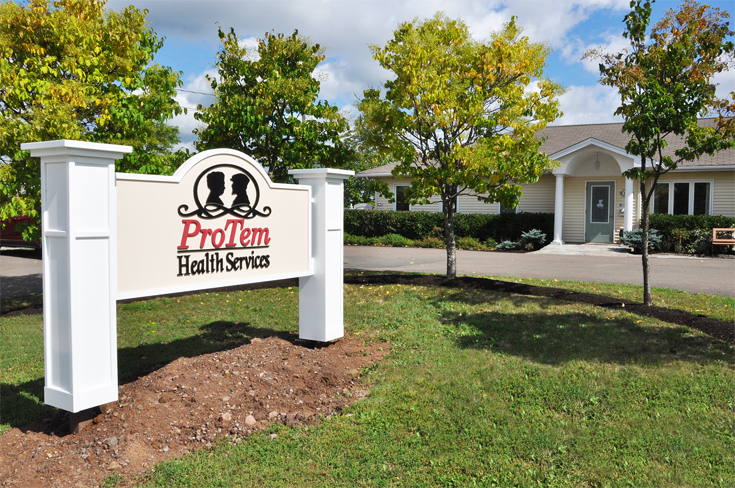About Dementia
Learn about the different types of memory diseases we specialize in at ProTem.
Frontotemporal Dementia (FTD)
Frontotemporal dementia (FTD), also known as frontotemporal degenerations, are a group of disorders characterized by ongoing nerve cell loss. The cerebrum is the main visible portion of the brain. And it’s divided into lobes: The frontal lobe, temporal lobe, parietal lobe, and occipital lobe.
The frontal lobe, which is the section at the front behind your forehead, and the temporal lobe, which is on the sides behind the ears, are the two segments of the brain affected by FTD. Depending on the location of nerve cell loss, this disease can affect the ability to use language, to walk well, or to function physically at all.
Arnold Pick, the physician who identified FTD in 1892, described a patient with specific symptoms related to language. As a result, this disorder is sometimes referred to as Pick’s disease.
Two primary proteins cause FTD and both proteins invade the frontal or temporal lobe. As a result, FTD disorders are divided between these two proteins: tau protein or TDP43.
Tau proteins are located in the axon of the nerve fibers, and we all have them in our brains. But sometimes they form in the neuroaxillary tangles that are found in Alzheimer’s disease and FTD.
TDP43 is found in the cell nucleus of most tissues and is involved in the production of protein. But it’s also found to be the culprit in Alzheimer’s and FTD.
There are three types of this disease that cause the frontotemporal dementia symptoms:
Behavior Variant Frontotemporal dementia (bvFTD), Primary Progressive Aphasia PPA, and Disturbances of Motor Function.
Behavior Variant Frontotemporal (bvFTD)- With this type of FTD, you’ll see conspicuous changes in personality, relationships, and conduct that you’d expect to see in someone in their 50’s and 60’s, but this person may be in his 20’s or up to his 80’s.
In this type of Frontotemporal disorder, the loss of brain cells is most dramatic in the areas that control a person’s conduct, judgment, empathy, and foresight…along with other abilities too. But it’s the behavior that stands out most sharply.
Primary Progressive Aphasia (PPA)
This frontotemporal disorder type affects language skills, communication, writing, speaking, and comprehension. While it typically shows up at mid-life, it can also show up in the later years.
There are two distinguishing types of PPA, each with its own unique characteristics.
- Semantic variant PPA is the form where people lose their ability to understand or frame the words in a spoken sentence of their own.
- Nonfluent/agrammatic variant PPA is characterized by the person’s speaking, which is hesitant and labored.
Disturbances in motor (movement and muscle) function
Three disorders fall under the frontotemporal degeneration umbrella that produce problems with muscle and motor function. A person can have the muscle and motor function effects and also have the behavior or language changes. Or…he can have the motor function alone with no other forms.
- Amyotrophic Lateral Sclerosis (ALS) – Otherwise known as Lou Gehrig’s disease, which is also the disease Stephen Hawking suffered from until his death. ALS is a disease of muscle weakness or muscle wasting.
- Cortical basal syndrome results in the arms and legs becoming uncoordinated and stiff.
- Progressive supranuclear palsy (PSP), which causes muscle stiffness, difficulty walking, and posture changes as well as eye movement changes.
While Alzheimer’s is most typically diagnosed in people over age 65, PPA and bvFTD are most often diagnosed in people in their mid-life years, from 45-65.
In people over 65, Alzheimer’s is far more common than FTD conditions, but in the 45-65 age group, the FTD conditions are nearly as commonly diagnosed as younger-onset Alzheimer’s.
If you’ve noticed any of the symptoms mentioned here in yourself or a loved one, do see your doctor so you can be evaluated and treated as early as possible.
Then call us. We can help you navigate the steps ahead, and arm you with information for making informed decisions.
This is a really tough time, we know. Don’t hesitate to call for a listening ear and reassurance. You don’t have to face these changes and decisions alone.
Contact Us
Visit us at:
71 Gorge Road
Moncton, NB E1G 1E5
Mailing address:
Box 4-120, 331 Elmwood Drive
Moncton, NB E1A 1X6
Telephone: 506.874.9652
Our five small homes are located in the Mapleton area of Moncton.
Sign Up for Our Newsletter




